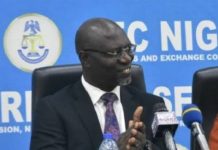Nigeria produces oil with foreign and local firms through production-sharing contracts and joint ventures (JVs) but investments have been held up because NNPC has been unable to pay its part: bills have been piling up since 2012.
Kachikwu said debt as of November stood at $3.5-$4 billion, which NNPC wanted to cut through deals such as a $1.2 billion multi-year drilling financing signed with Chevron in September.
“The target is that over 2017, we’ll begin to look at zero,” he said in an interview, referring to debt and the goal of ending the need for JVs to depend on NNPC cash.
NNPC was in talks with oil majors such as Italy’s Eni and oil traders Vitol and Gunvor, seeking partnerships to revamp assets such as refineries after decades of neglect. Cash-strapped for years, it reported a loss of 267.14 billion naira ($1.3 billion) for 2015.
“My ideal would be to bring in third party capital, do a joint investment and management of the refineries and work out a pay-out process over 5 to 6 years basically on lifting of some portion of the finished products,” Kachikwu said.












